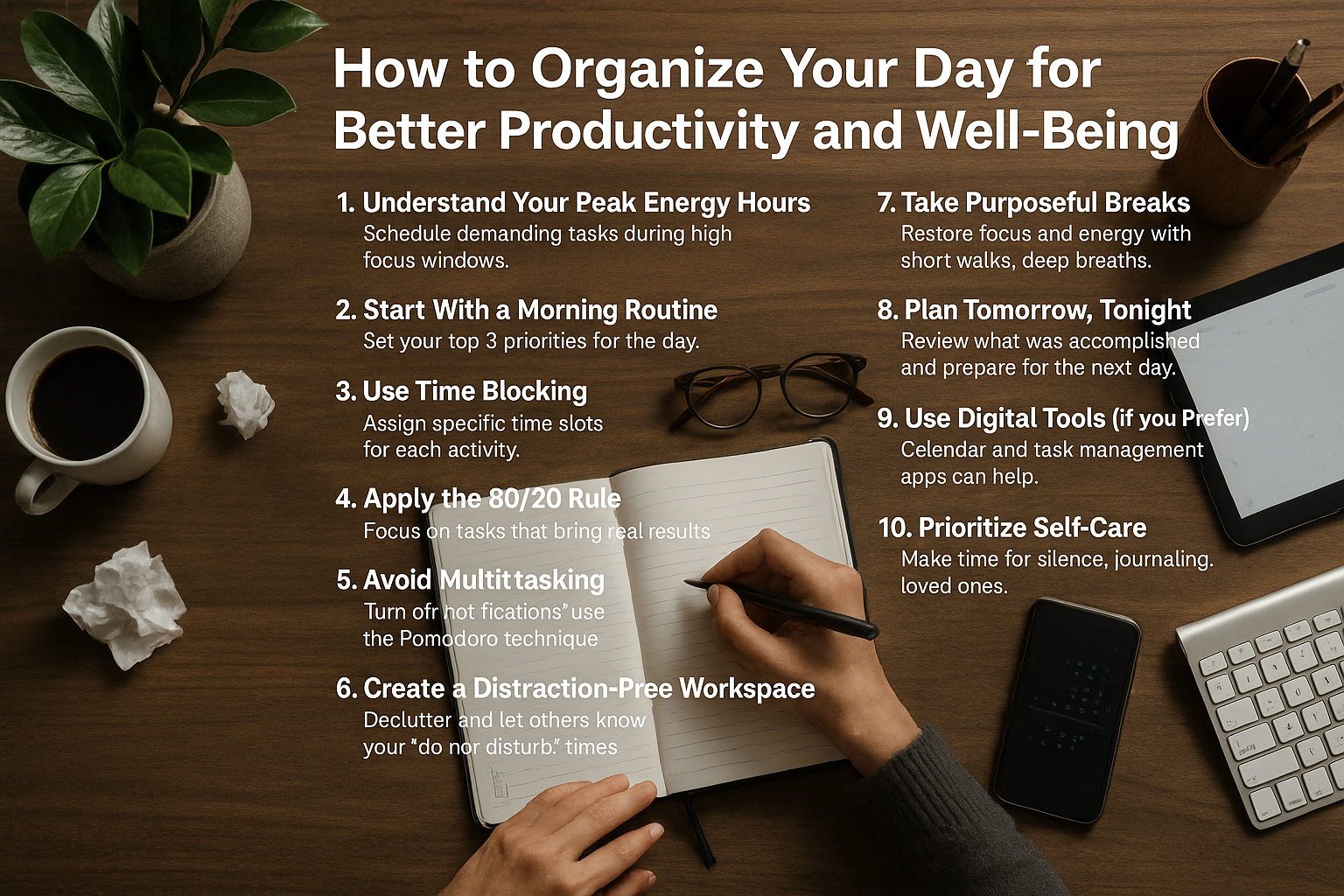The way we organize our day directly affects our quality of life, productivity, and even our mental health. Without planning, it’s easy to feel overwhelmed and unproductive. On the other hand, a well-structured routine can change everything.
In this article, you’ll learn simple and effective strategies to manage your time, get more done, and take care of your well-being.
Understand Your Natural Energy Rhythms
Everyone has their own natural energy cycle. Some people are more productive in the morning, others in the afternoon or evening. Knowing your peak energy periods helps you schedule your most important tasks when your focus is at its best.
Tip:
Keep a mini journal for 3 days and note when you feel most energetic and focused.
Start With a Realistic Plan
Planning your day isn’t just about making a to-do list. It’s about distributing your time wisely, allowing for breaks and flexibility.
How to plan effectively:
- Identify 3 to 5 key tasks for the day
- Include time for meals and short breaks
- Use simple tools like a planner, calendar, or app
Avoid overloading your day with too many tasks—it only leads to frustration and burnout.
Create a Morning Routine
A good morning routine sets the tone for the rest of the day. It doesn’t have to be long, but it should include energizing and centering habits.
Examples of morning habits:
- Wake up at the same time daily
- Drink water and stretch
- Plan your day
- Avoid screens in the first 30 minutes
This helps you start the day with focus and calm.
Use Time Management Techniques
Time management tools help you stay on track and avoid procrastination.
Popular techniques:
Pomodoro:
Work for 25 minutes, then rest for 5 minutes. After four cycles, take a longer break (15–30 minutes).
Time Blocking:
Divide your day into time blocks for specific tasks—emails, meetings, writing, breaks.
80/20 Rule:
Focus on the 20% of tasks that bring 80% of results.
Eliminate Distractions
Distractions are major productivity killers. Notifications, noise, and clutter can all derail your focus.
How to minimize distractions:
- Put your phone on “Do Not Disturb” mode
- Use instrumental music and headphones
- Keep your workspace tidy
- Use social media blocker apps
Make Time for Yourself
Taking care of yourself is just as important as being productive. Regular breaks help maintain mental clarity and physical energy.
Healthy break ideas:
- Take a short walk
- Meditate for 5 minutes
- Read a few pages of a book
- Enjoy your coffee mindfully
Short breaks refresh your brain and prevent burnout.
Create a Night Routine
How you end the day affects your sleep and your next morning.
Positive evening habits:
- Disconnect from screens an hour before bed
- Write a gratitude list or journal
- Plan the next day
- Sleep at a consistent time
Good sleep boosts memory, mood, and productivity.
Do Weekly Reviews
Besides daily planning, review your week to realign your goals.
How to review:
- Set aside 30 minutes on Sunday or Monday
- Reflect on what worked and what didn’t
- Plan the week based on your top priorities
Keep It Simple
Daily organization doesn’t have to be complicated. Find what works for you.
- Prefer paper? Use a notebook or planner.
- Prefer digital? Try Google Calendar, Notion, or Trello.
- No time? Just plan main time blocks and adapt on the go.
The goal is to create a system that supports your life.
Final Thoughts: Structure Brings Freedom
Organizing your day doesn’t mean being rigid—it means giving yourself the freedom to live with clarity and peace. With a little planning, you can accomplish more and still have time for yourself.
Remember: productivity is not about doing more—it’s about doing what matters, with intention.
